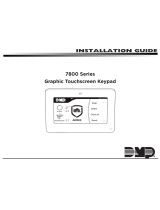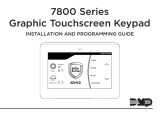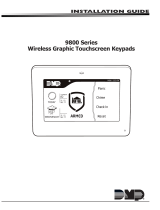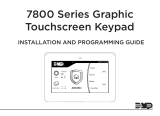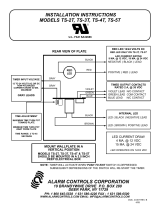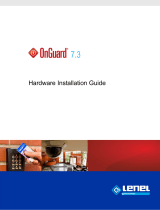Page is loading ...

Installation
LT-0247 (10/95)
Model 781 "Easy Entry" Wiegand Input Keypad
Description
The 781 Wiegand Input keypad is an enhanced Security Command Keypad that allows you to connect Wiegand format
access control readers to DMP Command Processor™ panels. Any proximity, magnetic stripe, or other reader
technology that provides a Wiegand data format can be used with the 781 keypad.
How the 781 Works
The 781 keypad works by allowing users to present a card or token to an access control reader that in turn sends data
containing their user code to the keypad. The 781 reads the user code, verifies its authority with the panel, and then
powers its on-board Form C relay releasing a door strike or magnetic lock. The door being controlled by the relay must
then be opened within five seconds to start the 30 second "Soft-Shunt™" entry/exit timer. The user code sent by the
card reader can also be entered manually by the user through the keypad.
Zone three Request to Exit
You can also connect a normally open PIR or other motion sensing device to zone three (White/Orange pair) on the
781 to provide a hands-free request to exit capability to the system. When the user is sensed by the device, its contacts
short zone three and cause the keypad relay to activate for five seconds. During this time, the user must open the
protected door to start the 30 second "Soft-Shunt™" entry/exit timer. If the door is not opened within five seconds, the
relay restores the door to its locked state.
Door contact loop with Soft-Shunt™
Connect the wiring from the controlled door's normally
open or normally closed contact to Loop #2 (White/Red
pair) on the keypad harness. Once the door strike relay
is activated, the user has 5 seconds to open the door
connected to Loop #2. The loop is then automatically
shunted for 30 seconds.
12 VDC access control readers
Connect the Red and Black power wires from the
reader to the power wires from the panel. These
connect in parallel with the keypad power wires. Connect
the White data wire from the reader (Data 1) to the
White wire on the 5-position keypad harness. Connect
the Green data wire from the reader (Data 0) to the
Green/White wire on the 5-position keypad harness.
5 VDC access control readers
Connect the Black power wire to the Black Common
wire from the panel. Connect the Red power wire from
the reader to either a separate power supply or to a 5
volt regulator placed in series with the Red power wire
from the panel. Connect the White data wire from the
reader (Data 1) to the White wire on the 5-position
keypad harness. Connect the Green data wire from the
reader (Data 0) to the Green/White wire on the
5-position keypad harness.
Once all the wire connections are made, mount the
keypad using appropriate size anchors and the four
enclosed #6 machine screws. Use the two #6 x 32 flat
head screws when mounting the keypad on a single
gang box.
Figure 1: 12 VDC reader wiring
Black
12 VDC Card Reader
Zone 2 White/Red DOOR CONTACT
Zone 3 White/Orange REQUEST TO EXIT
Green
White
To keypad data bus
}
}
}
}
Zone 1 White/Brown
Zone 4 WhiteYellow
Violet - Door Strike Normally Closed
Gray - Door Strike Common
Orange - Door Strike Normally Open
White - Connect Reader Data 1
Green/White - Connect Reader Data 0
Red
Black
Red
To keypad data bus
}
}
}
}
Zone 2 White/Red DOOR CONTACT
Zone 3 White/Orange REQUEST TO EXIT
Zone 1 White/Brown
Zone 4 WhiteYellow
Violet - Door Strike Normally Closed
Gray - Door Strike Common
Orange - Door Strike Normally Open
White - Connect Reader Data 1
Green/White - Connect Reader Data 0
5 VDC Regulator
Red
Black
Red/White
Red
5 VDC Card Reader
Red Black
Green
White
Regulator supplied with
Model 544 and 644 readers
Figure 2: 5 VDC reader wiring with regulator
2500 N. Partnership Boulevard Springfield, MO 65803 www.dmpnet.com Digital Monitoring Products

Harness Color Code
Panel Loops Door Strike
Red - Auxiliary Power White/Brown - Loop 1 Violet - Normally Closed
Yellow - Data Transmit White/Red - Loop 2 Gray - Common
Green - Data Receive White/Orange - Loop 3 Orange - Normally Open
Black - Ground White/Yellow - Loop 4 White - Reader Data 1
Gr/Wh - Reader Data 0
Address Programming
Each 781 keypad must be programmed with its own device address. This
addressing is done through the use of slide switches located on the left side
of the keypad's printed circuit board. To set the switches, use a small slotted
screwdriver and gently slide the switch to either the up or down position
according to the address table to the right.
Programming Access Cards into the System
Once the 781 keypad is installed and operational, you can begin programming user information into the panel. To do
this, access the USER MENU and select USER CODES?. Then choose ADD. When the keypad displays ENTER
CODE: - , present the user's card to the reader. The 781 works by reading the 4 or 5 digit user code from the data sent
by the access control reader. For more information, refer to the Security Command User's Guide section on adding,
deleting, and changing user codes.
Panic Signal
The 781 keypad can also provide users with a panic feature by programming loop 1 as a panic loop and installing a
1k ý resistor across the White and Brown wires. Afterwards, pressing the 7 and 0 keys simultaneously shorts loop 1
and sends a panic report to the panel. The loop returns to normal when you release the keys. This feature can be
disabled by cutting the jumper J3 on the lower right corner of the keypad circuit board.
Electrical Specifications
The 781 keypad operates on 6 to 16 VDC at 100mA maximum with an unlit display. Current increases to 125mA with
the display lit. You can install the 781 on individual wire runs of up to 500' using 22 gauge wire or up to 1,000' using
18 gauge wire. Below are specifications for individual readers:
MP-5365 MiniProx® Proximity Reader - 60mA at 12 VDC
PR-5355 ProxPro
® Proximity Reader - 60mA at 12 VDC
TL-5395 ThinLine II™ Switch Plate Reader - 60mA at 12 VDC
544 Insertion Mag Stripe Reader - 35mA at 5.5 VDC
644 Pass-Through Mag Stripe Reader - 35mA at 5.5 VDC
Additional Power Supply
If current draw for all keypads connected to the panel exceeds the panel's output, you can provide additional current
by adding an auxiliary power supply. Connect all keypad common wires to the negative terminal of the power supply.
Run a jumper wire from the power supply's negative terminal to terminal 10 of the panel. Connect all keypad power
(+12 VDC) wires to the positive terminal of the power supply. Do NOT connect the positive terminal of the power supply
to any terminal of the panel.
AC LED
The 781 keypad also contains a green AC power LED. This LED is off when AC power to the panel has been interrupted
or while the panel is resetting.
Door Strike Relay Specifications
The 781 keypad provides one Form C (SPDT) relay for controlling door strikes or magnetic locks. Three wires, violet,
gray, and orange, provide for connection to the N/C, Common, and N/O contacts of the relay. The contacts are rated
for 1 Amp at 24 VDC or 0.5 Amp at 120 VAC.
8
7
65
4
321
1 2 3 4
ON
1 2 3 4
ON
1 2 3 4
ON
1 2 3 4
ON
1 2 3 4
ON
1 2 3 4
ON
1 2 3 4
ON
1 2 3 4
ON
Digital Monitoring Products www.dmpnet.com 2500 N. Partnership Boulevard Springfield, MO 65803

Door Strike Relay Operation
As soon as the user code sent from the reader has been verified by the panel, the keypad Door Strike relay activates
for five seconds. During this time, the access door (connected to loop #2) must be opened to start the 30 second
entry/exit timer and loop soft shunt. See the timeline shown below.
User's Guide
The 781 works in three different modes: Door Strike, Arming and Disarming, and Entry Delay. All of the examples below assume that
CLOSING CODE is YES in the panel's programming.
DOOR STRIKE
Area and All/Perimeter Door Strike - From the Status List,
present your card to the reader. Once it is validated by the
system, the Door Strike relay activates. See Door Strike Relay
Operation above. Home/Away systems only activate the Door
Strike relay when arming and disarming.
ARMING AND DISARMING
Area system Arming and Disarming - Press Command. The keypad displays ARM DISARM. Press the Select key under either
option. The keypad displays ENTER CODE: -. Present your card to the reader. Once it is validated by the system, all areas accessible
by you arm or disarm automatically and the Door Strike relay activates.
All/Perimeter system Arming and Disarming - Press Command. The keypad displays PERIM ALL (when arming) or DISARM?.
Press the Select key under the option. The keypad displays
ENTER CODE: -. Present your card to the reader. Once it is
validated by the system, both areas arm or disarm automatically
and the Door Strike relay activates.
Home/Away system Arming and Disarming - Present your
card to the reader. If the system is armed, once the card is
validated all areas are disarmed.
If the system is disarmed when you present your card, once it is validated all areas are armed in the AWAY mode.
ENTRY DELAY
All Systems - Once the protected door is opened and the
entry delay starts, the keypad displays ENTER CODE: -.
Present your card to the reader and, once it is validated, the
system disarms all areas accessible by you and activates the
Door Strike relay. Area systems provide a delay to allow
selected areas only to be disarmed. See Arming and Disarming
above.
Using the access reader for user menu access
You can also use a Wiegand type reader connected to the keypad to access the User Menu when the MENU? NO YES display is
shown.
MON 2:30 PM
While the keypad is in
the Status List, present
your access card.
or
PERIM ALL
DISARM?
The system arms or disarms
the areas and activates the
Door Strike relay.
ARM DISARM ENTER CODE: - ALL? NO YES
5 Second
Strike
Access door
is opened.
30 Second "Soft-Shunt"
and entry/exit timer.
30
Seconds
At 20 seconds, the
keypad begins
beeping if door
has not closed.
If access door is still
open past 30 seconds, a
loop fault is indicated.
End of
timer.
The relay activates for
five seconds during
which time you can open
the door.
Once you open the door,
you have 30 seconds to
exit and close the door
before the loop 2 Soft-
Shunt expires.
Select NO to arm or disarm
individual areas. Select YES, or
simply wait, and the keypad will
automatically arm or disarm all
areas for which you are authorized.
ENTER CODE: -
The system disarms the
areas and activates the Door
Strike relay. Area systems
allow a delay for you to
select only certain areas.
See Arming and Disarming.
2500 N. Partnership Boulevard Springfield, MO 65803 www.dmpnet.com Digital Monitoring Products

Self-Test Diagnostics
The 781 keypad allows you to test its system keypad functions at any time.
To test the keypads:
• Disconnect the red (+12 VDC), yellow, and green keypad wires from the panel.
• Twist the yellow and green keypad wires together. Reconnect the red wire to the panel.
The keypad display shows: TEST PROCEDURE.
TEST 1 DISPLAY TEST
This test begins immediately and scrolls a series of characters across the display allowing you to visually inspect each
display segment.
To go to the next test, press the COMMAND key. To repeat a test, press the ARROW key.
TEST 2 KEY TEST
This allows you to check each key for proper operation. The display shows: PRESS KEY— . As you press and hold
each key, its name is displayed.
TEST 3 LOOP TEST
This allows you to check each keypad loop for proper operation. The display shows: L1 L2 L3 L4.
Following each loop number is the status of the loop. (O) = Open, (–) = OKAY, and (S) = Short.
TEST 4 FUNCTION TEST
This allows you to check the AC LED, door strike relay, and keypad tone for proper operation. The display reads:
LED RLY TONE. To test each function, press the SELECT key beneath its name. The keyboard backlight turns off
during this test.
TEST 5 ADDRESS TEST
This test displays the address selection of the keypad. The display changes if the keypad address switches are
changed. A ? (question mark) is displayed if an address selection above 8 has been made. To end the Address Test,
press COMMAND. The display reads: * * TEST END * *.
Ending the Test
Disconnect the red (+12 VDC) wire from the panel. Separate the yellow and green keypad wires and reconnect them
to the panel. Connect the red wire to the panel. Press COMMAND to start the keypad's normal operation.
Additional Diagnostics
If at any time during normal operation a keypad cannot detect polling from the panel on the green keypad wire, the
display reads: SERVICE REQUIRED. This indicates the green wire may be broken.
If at any time during normal operation a keypad detects polling but its particular address is not being polled, the display
reads: NON-POLLED ADDR. To clear this display, check the address selection on the keypad or the number of
keypad addresses you've assigned during system programming.
Digital Monitoring Products
2500 N. Partnership Boulevard Springfield, MO 65803 800-641-4282
/




